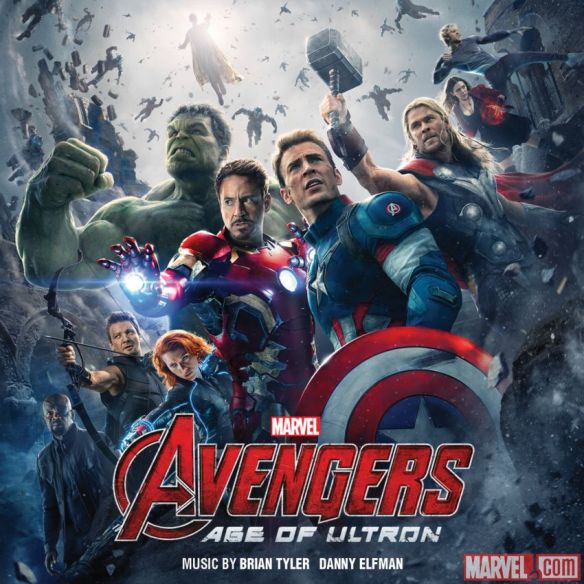 Hannah and I thought it might be fun to do a review of The Avengers: Age of Ultron together, so you get two opinions for the price of one!
Hannah and I thought it might be fun to do a review of The Avengers: Age of Ultron together, so you get two opinions for the price of one!
First we’d like to deal with Ultron, and the delightful portrayal by James Spader – it might only be his voice onscreen, but his presence was stamped all over the robotic villain.
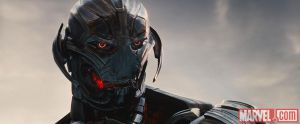
Mel: Ultron made for a highly entertaining supervillain. His crazy genius was in turn highly amusing and downright terrifying. His arrogance surpassed even Tony Stark’s, which makes sense, since Stark created him. Seeing a range of tonal and even facial expressions on a robot, has to be one of the funniest things I’ve seen – at least in a while. And that voice. When he spoke I paid attention, even when his grandiose statements made me groan! In the interests of being constructive, the only real criticism I have, is the rushed introduction to Ultron’s hatred of Tony and the other Avengers. In the space of a few seconds (yes I know he’s incredibly smart), he turns against his creator – without even having interacted with him. I connected the dots, but it would have been nice to see greater conflict in the beginning.
Hannah: Ultron was one of my favorites too! I thought his dialogue was very skillful — he mimics the sort of villain who has a grand (but misguided) scheme for making the world a better place, but he’s not that kind of villain. His plan didn’t make much sense, but that works… He’s a flawed program built from an alien weapon and Tony Stark’s fear. It all comes back to Tony as the movie’s villain, the self-proclaimed mad scientist whose creation is out of control. Yet he’s on the heroes’ side, and I don’t think I’ve ever seen that kind of structure before! That brings me to my VERY favorite part, though: The Vision. One of the (many) new characters added in this movie.
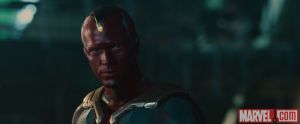
Mel: I loved Vision too. This may have something to do with the fact I have a slightly unhealthy obsession with Jarvis! I loved that Vision incorporated his essence – that dry, unaffected sense of humour – love it! In relation to Ultron, I enjoyed the fact that, ultimately, Ultron is responsible for Vision’s creation. In a way, Vision is the balance – the positive effect of Tony’s creation and his evolution was thrilling to watch. The hammer moment was particularly clever, because it cut through all those questions about his morality – it also added to the overall humour. I enjoyed the twins, especially Wanda, but the person who really stood out for me was Hawkeye. He might not be a new character, but we certainly saw a new side to his character. I thoroughly enjoyed the way he became almost like the glue that held them all together.
So, Hannah, what are your thoughts? I know you’re dying to talk about Vision!
Hannah: They really did a good job of balancing so many characters! I thought Hawkeye’s development was a little implausible, but cool and creative all the same. And I definitely appreciated the moment he stopped Wanda from messing with his mind, after all the fuss about that in the first movie. But The Vision was absolutely my favorite part. He is so, so good. He’s perfect in the story, as the final form of what Tony was trying to create. I think Tony had in mind a more comprehensive system of defense, but what he really wanted was The Vision. Something insanely powerful and transcendentally good. Instead of having a flawed, weaponized beginning, Vision is created from a combination of good things, Jarvis foremost among them.
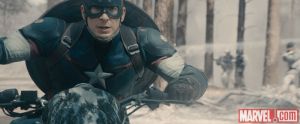
Funnily enough, I hardly know the Vision at all from the comics, so I can’t say much about how he’s the same or different. My main reference for how much I love him in the movie is actually Superman, or Captain America in the MCU. Lots of people don’t like “good” characters because they think they’re boring, but they don’t have to be. Cap is a good person, despite all the darkness he’s seen, without being naive and cutesy or boring. That’s what makes him inspiring, and it’s the same in a really good Superman story. Vision being so colorful is related to that. It’s okay for him to be a little more stylized and have a flowing golden cape because he’s symbolic in a way the other characters aren’t. I could go on about this forever, I really could. Of course, anything could happen now. Maybe his Ultron origins will come back to haunt him, or his alien point of view will cause him to act against the Avengers.
This whole movie seemed transitional, tying in to Loki’s staff and whatnot from the past and thematically connected to Iron Man 3, but mostly foreshadowing future events. How does this movie fit?
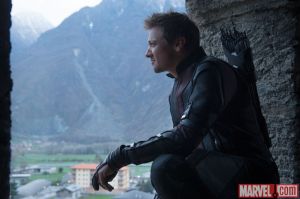
Mel: Before I answer that question, I wanted to go back to your point about Hawkeye – the way he prevented Wanda from messing with his mind. This was a powerful scene for me (I think I may have done a mini fist pump) because his mind is one of his sharpest tools; his focus. Clint has a deep sense of honour and Loki took that away from him. In Age of Ultron we got to see who Hawkeye really is, and I think he helped to humanise the team in a way – to be their anchor. Anyway. On to the questions about where the movie fits.
The movie certainly set some of the groundwork for the transition into the next phase. It will be interesting to go forward with the current team. As it stands Thor has returned to Asgard, Hulk is goodness knows where (for the time being), Tony took a step back, and Hawkeye is hanging out at the ranch. So that leaves us with Cap, Black Widow, Falcon, War Machine, the Scarlet Witch and (happy dance), Vision! These additions still offer a powerhouse in terms of ability, and at the same time, a new dynamic. So, though I don’t see this team lasting very long, it will be fun to see where they take us, and how they fit into the next phase.
I think the destruction inadvertently caused by the Avengers in this movie, definitely set things up for Civil War. First we had the debacle in South Africa when Hulk lost control, and the obvious battle in Sokovia. If this isn’t the cause of the civil war, it’s certainly fuel for the fire. How do you think these storylines will fit into upcoming movies, like Civil War? Are you happy with the development of the characters so far?
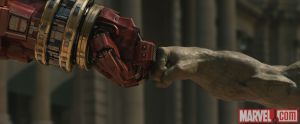
Hannah: The movie certainly highlighted destruction, so they may well be using that as a sticking point in Civil War. They make an effort to save civilians, but they can’t always be successful. For instance, Tony picked an empty building to throw Hulk through, but he didn’t do anything to protect all the people in the street when the building fell. So, I think it’ll be a worthwhile debate rather than a contrived conflict.
Age of Ultron did a good job of giving each character a little bit of attention, but not too much. It’s essentially a character-driven movie, a very simple plotline serving as a vehicle for little bits of character development. I see it as almost a cutoff point, tying up dangling threads so they can have standalone movies and then come back. We’ve basically set up “intervening events” rather than “the next Avengers movie.” A smart way to do it.
Mel: I couldn’t agree with you more about the character-driven plot. It was one of my favourite elements; the unity within the team. We’ve come to expect the humour, but this time there was a level of cohesion we haven’t seen before. I wish I could give you a favourite quote, because there are many great examples, but I’m having a hard time deciding! Certainly the running joke about Cap’s language highlighted their camaraderie, and the way they now work together (especially Cap and Thor), was just wonderful.
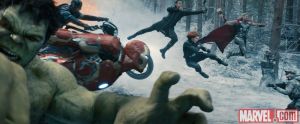
We could talk about the visual effects all day, because they were truly magnificent. I’ll just talk about my favourites. I absolutely loved Veronica (Tony’s Hulk buster!), especially when she sent in reinforcements. I particularly enjoyed the opening scene, not least because it set things up in terms of how seamlessly the team work together. I loved Natasha’s ‘Can someone take care of that bunker’ – cue Hulk! And then, of course, there is the scene where the Avengers unite (including Quicksilver and Scarlet Witch) – taking out Ultron’s robot army and basically kicking ass!
What about you Hannah? Which scenes stood out to you? Do you have a favourite quote?
Hannah: I think the answer to that is, “I need to see this movie again!”
While the plot is simple, the characters are complex, and there’s plenty more to say. Leave your Age of Ultron reactions in the comments!



















